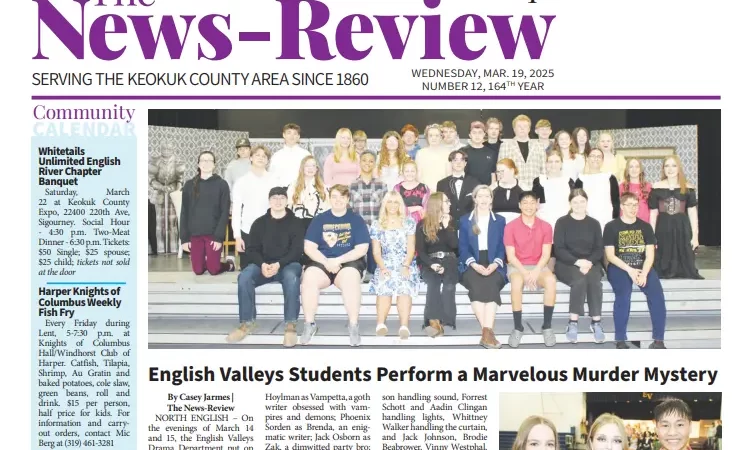By Casey Jarmes | The News-Review
SIGOURNEY – During the March 12 meeting of the Sigourney School Board, the board met with Chris Shadduck, a Wapello County Sheriff’s Deputy who has worked as a School Resource Officer at Cardinal for six years. Sigourney Superintendent Kevin Hatfield stated that there was no commitment from the Keokuk County Sheriff’s Office yet, but that he hoped to have a SRO at Sigourney in the future. Shadduck gave an overview of his job, which includes ensuring the safety of students and staff, enforcing school policies and laws, mentoring and counseling students, handling fights, and educating students about things like constitutional amendments, online predators, dating, and drugs and alcohol. He stated that four students from Cardinal who later went into law enforcement told him they would not have if they didn’t have interactions with him as a positive law enforcement officer.
Shadduck stated that it was difficult to set-up his position at Cardinal, due to the optics, and that, when he started, people asked if things were really so bad that they needed a school cop. He stated he is not there because things are bad, but to be another resource to use. He stated that multiple staff members told him, when he was first hired, that they didn’t need an SRO and that this was a waste of money, and that all of those staff members apologized. He explained that his presence gives students positive interactions with law enforcement and that, before he was hired, his only interaction with kids was negative, when he would come to their parents’ houses to arrest them or to the school to take kids to juvenile court.
He explained that he is at Cardinal full-time, but is required to spend one hour patrolling in either Eldin or Agency every day, and that he works the road when school is out of session. Shadduck stated that he works with counseling staff and is good at getting kids to admit things they wouldn’t admit to anyone else. He stated Cardinal only has around three or four criminal charges a year. He stated he doesn’t issue tickets for tobacco, because parents usually end up paying them.
Hatfield stated that state rules limit the sharing of surveillance with law enforcement, but that there is more flexibility with an SRO. He stated that the legislature is trying to fund SROs more. Board member Alan Glandon asked about training and Shadduck stated that SROs just need to be trained as a peace officer. He encouraged the board have any SRO they hire attend a week-long training problem, to teach how to deal with things cops don’t normally deal with, like how to deal with autistic children without escalating. He stated he doesn’t assist with restraining students unless staff is assaulted and had only had to a few times in his career.
Also at the Wednesday meeting, High School Principal Shannon Webb explained that the school is planning to have two classes next year taught by Curriculum Director and Work-Based Learning coordinator Jenny Bell: Work-Based Learning program Savage Advantage, which will take the place of the current Work-Based Learning class for Juniors, and a new Freshman Seminar class that most Freshman will take, which will help them identify goals and priorities, figure out what they want to do in the future, and prepare for Savage Advantage. She stated her and Bell had talked to students about the class and that they were excited. Webb stated they were meeting with Keokuk County Hospital and Clinics and Singlair Tractor to set up WBL partnerships.
Elementary Principal Deanna Spence brought up the morning Science Extension Time and a planned Science Genius Hour, where kids doing well in their classes will be able to meet with Bell and explore science topics they are interested in. She brought up plans to have TAG students design, sell and market items made using a 3D-printer to other students, then using the money received to buy printer filament. She stated they were looking into grants and that one family was offering to donate a refurbished 3D printer.
Webb stated that there was a big push from the state towards WBL, which is now part of school report cards, and that Sigourney was lucky to already have WBL programs. Bell talked about a student who plans to become a paralegal and has begun working with Keokuk County Attorney Amber Thompson as part of WBL; she stated that the student almost bailed because of nerves, but that she convinced her to go back and that the student was now loving it. She stated it was important to give kids experience and help them find out what they want to do before they go to college, and that this program would help the community. Hatfield stated that the world was changing and it was good to help kids figure out their interests.
Board Treasurer Jessica Meier gave the board a lengthy overview of the district’s finances in preparation for the upcoming budget hearings. She explained that the county mistakenly sent out last year’s proposed tax notices instead of this year’s, leading to confusion. Webb stated she had received multiple phone calls from people who assumed the district was raising taxes. Meier stated new tax notices should be sent out soon. Meier explained that the district does not yet know what increase in State Supplemental Aid Iowa schools will receive this year. The governor and Iowa Senate have proposed a 2% increase, while the house has proposed 2.25%. She stated she planned the budget based on a 2% increase. With a 2% increase, Sigourney will receive $157 per pupil, totalling $46,285. With 2.25%, it will receive $176, totalling $56,906.
Meier stated that Sigourney will go from receiving funding from one Education Savings Account to four this year, receiving $1,300 per ESA. Hatfield noted that, in the 2023/2024 school year, there are currently 496 resident students living in Sigourney’s district and that Sigourney has a certified enrollment of 562. This compares to 487 and 552 the year before, 491 and 538 in 2021/2022, 504 and 550 in 2020/2021, and 544 residential students versus 575 certified enrollment in 2012. Hatfield explained that the number of kids in the district was declining, but enrollment was staying steady, as Sigourney recoups losses through open enrollment. He stated that Sigourney needs to be a destination school.
Meier stated that the district’s unspent balance ratio and solvency were both good. Hatfield stated that a legislator he had spoken to said that there would be a 40% increase in funding for ESAs, more commonly referred as school vouchers, compared to the 2% increase in public school funding, and that this would put more pressure on public schools. Meier stated that, next year, there will be no income or attendance guidelines for vouchers, allowing anyone with a voucher to attend a private school.
Meier showed a chart of the district’s tax rate over time, which was $11.37274 per $1,000 of assessed value in the 2024/2045 school year, compared to $11.46208 the year prior, $11.99551 two years ago, $12.34032 five years ago, $14.33076 ten years ago, and $17.67993 in 2012/2013, the highest year listed. She stated that, despite this, the district was generating more money due to a combination of high enrollment and high evaluations; the district brought in $2,592,629 from property taxes this year, compared to $2,339,129 in fiscal year 2024 and $2,486,137 the year before that. Meier stated that the state wants the school to justify to the public why it is receiving an increase in money received, even if the tax rate goes down. She stated that, when the tax rate was higher, the district had no ongoing projects, and speculated the current lower rate would motivate people to agree to a proposed bond for school renovations in the fall.
Hatfield brought up sharing dollars, stating that, if the district shared a police officer with the city or county, the state would pay half the officer’s salary, allowing the district to only have to pay a quarter of the cost to have an SRO. Meier stated that sharing dollars pay for most of the salary for Jenny Bell, who is split with Williamsburg. At the end of the presentation, Meier showed the proposed fiscal year 2026 tax levy of $11.36867, which, assuming a 2% SSA, would bring in $2,618,349 in tax dollars. The proposal also included an increase in management levy from $50,000 to $125,000 and an increase in Income Surtax on the Instructional Support Levy from 2% to 4%.
Meier stated the district did well on its state audit. The district exceeded its budget in its instructional budget and other expenses. She stated that she would project expenses better in next year’s budget.
The board approved a new plan for replacing uniforms on a set, staggered schedule, which the board looked over. Hatfield explained that the new policy states that any customization for uniforms must be removable, for example by being velcro or loosely sewed on. Students will still be allowed to purchase their uniforms from the school at the end of the season. Hatfield explained in the past that customization on uniforms has resulted in baseball uniforms being replaced yearly. He stated these changes were being made to relieve costs for parents. Hatfield stated that the district wasn’t allowed to fundraise for uniforms directly, but was allowed to fundraise for sports programs and have some of those funds go towards uniforms.
Hatfield showed the board several material samples and bids for replacing the floor in the elementary gym and cafeteria, which will be paid for out of leftover contingency funds for last year’s elementary infrastructure project. He recommended the board go with a $62,130 bid from Phillips Flooring out of Indianola for a tough, non-porous polyurethane roll floor with a cushion underneath. The bid came with painting for sports lines, but would cost $2,500 to feature the school logo. The Phillips Flooring bid also came with a 20 year warranty. Hatfield stated he dismissed several bids for being porous, which is bad for a cafeteria floor, or for being from out of state companies. He stated that there could be issues with this floor being torn up if tables were dragged across it, which was not covered by the warranty.
Board member Tim Bruns raised concerns with moisture damaging the floor. Board member Adam Clark stated he was concerned about tables cutting up the floor. Bruns suggested instead doing an epoxy floor. Hatfield stated that would require tearing up the tile below the gym floor, which would likely expose asbestos, and that removing potential asbestos would cost $200,000 the school doesn’t have. Glandon asked about the timeline for the floor replacement. Hatfield stated the company would need a few weeks to work, in addition to six weeks of lead time, meaning the project could be done over the summer if approved tonight, but would have to be pushed back if vote was delayed for a month.
Hatfield stated he didn’t think an epoxy floor was a good idea. Board member Stven Seeley stated he didn’t think they could find a company to put in an epoxy floor. Clark stated that they wanted to do things correctly the first time, which Bruns agreed with. Hatfield stated that, if the floor is done, then all of the work will be completed at the elementary, allowing the board to focus on the secondary building. The board voted to approve the Phillips Flooring bid, with Bruns casting the sole no vote.
The board approved purchasing a new lawnmower from Sinclair Tractor for $13,318.





